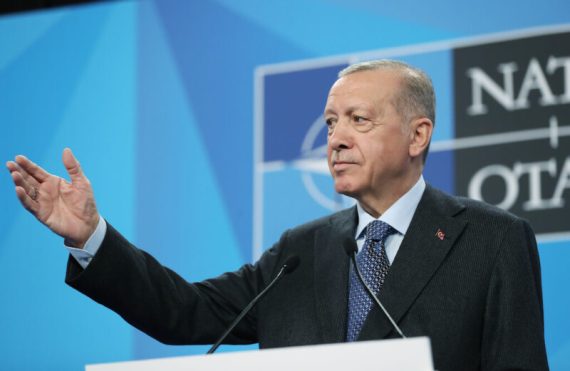B
oth in Turkey and in many capitals across the world, Turkey’s presidential and parliamentary elections to be held on May 14 are considered among the most important events of the year. Washington and most European capitals view the elections as an opportunity to end Erdoğan’s rule in Turkey, which they view unfavorably. In a speech during his presidential candidacy, U.S. president Joe Biden made it clear that he wanted to overthrow Erdoğan by supporting “those elements of the Turkish leadership that [he thought] still exist, and get more from them and embolden them to be able to take on and defeat Erdoğan.” Biden also alleged in the same speech that he wanted to overthrow Erdoğan “not by a coup, not by a coup, but by the electoral process.”
It is not possible to know exactly what the Biden administration has done to achieve this goal. What partnerships Biden has formed to date with—in his own words—”elements of the Turkish leadership” in order to overthrow Erdoğan, how much “yield” he has gotten from them so far, and how much this will affect the election results in Turkey are all unknown.
No doubt, Turkey’s presidential elections and foreign policy preferences are interconnected: the ruling AK Party’s foreign policy preferences affect the election process and its results, and, at the same time, the election results determine Turkey’s foreign policy direction.
How do the AK Party’s foreign policy preferences affect the elections?
President Erdoğan’s foreign policy trajectory is one of the main reasons behind the aforementioned U.S. stance on the upcoming Turkish elections. The way Turkish-American relations were built in the aftermath of World War II and the course of relations thereafter led Washington, which had supported Turkey in the face of threats emanating from Soviet Russia, to think that it could directly intervene in Turkey’s domestic and foreign policy in return for this support.
In line with this understanding, during the Cold War, the U.S. administration did not hesitate to intervene in Turkish politics when it deemed necessary, either with tanks on the streets or other methods. Turkey was not the only NATO member to be subjected to Washington’s direct or indirect interventions under Cold War conditions. However, during the AK Party era, Turkey’s pursuit of a more independent foreign policy, both through the self-confidence of its rapid increase in economic and military capacity and the leadership qualities of Tayyip Erdoğan, led to serious crises between Washington and Ankara.
The United States, uncomfortable with Ankara’s shift away from Washington’s line, especially in its Middle East policy, has intensified its pressure on Turkey, while Ankara, to balance these pressures, has turned to cooperation with countries such as Russia within the framework of its multidimensional foreign policy approach. This, in turn, has led to an increase in Washington’s pressure, creating a vicious circle in the relations between the two countries that is difficult to overcome.
The main reason for this development is the unwillingness of the United States to accept Turkey’s desire for a more balanced relationship between the two countries based on sovereign equality. The AK Party government’s foreign policy approach, which has been more independent and has prioritized Turkey’s interests, has not aimed to turn Ankara’s back on the West, but rather to enhance the security partnership with the U.S. within the NATO framework.
Turkey’s desire has simply been to contribute as an equal sovereign partner to the shaping of NATO and U.S. security policies in the Middle East, the Eastern Mediterranean, the Balkans, and the Caucasus. Ankara wanted and continues to want to end of policies formulated in Washington or other Western capitals on Turkey. The efforts of anti-Erdoğan and anti-AK Party circles in the U.S. security bureaucracy, politics, and media to force Turkey into the Western orbit instead of accepting its new identity have plunged relations between the two countries into one of the deepest crises in history.
At this point, we are faced with a United States that openly supports the YPG, the Syrian branch of the PKK, which is the biggest security threat to Turkey, an America that pursues an anti-Turkey policy in the Eastern Mediterranean, and an American president who aims to overthrow President Erdoğan through elections.
Will the election results affect Turkish foreign policy
Tayyip Erdoğan is a politician determined to maintain the multidimensional foreign policy approach Turkey has practiced so far, while his opponent Kemal Kılıçdaroğlu is expected to rebuild the old style of relations between Turkey and the West. In fact, while it is clear what the two major components of the People’s Alliance, the AK Party and the MHP, stand for in foreign policy, it is not clear how the two major components of the Nation Alliance, the CHP and Iyi Party, and the HDP, which has entered into a named electoral alliance with them, will compromise on foreign policy. The goal of overthrowing President Erdoğan seems to be the only common point that unites these two parties—in this respect, they share a similar goal to Biden.
But can we talk about a harmony between the components of the Nation Alliance on what Turkey’s policy towards the PKK/YPG should be? The HDP, the Kurdish ethno-nationalist separatist party, supports the PKK/YPG and, in line with the Biden administration, backs the YPG in Northern Syria and shares the goal of overthrowing Erdoğan. However, the nationalist Iyi Party has a different understanding on this issue for sure.
The CHP, on the other hand, seems to be a political party that includes people close to both sides of the PKK/YPG issue. If the Nation Alliance, which is united around the simple goal of toppling Erdoğan, wins the elections, Turkey is likely to face a major fight over its PKK/YPG policy. This is because the U.S. and the HDP are not expected to give up the “gains” the PKK/YPG has made thus far in Syria.
Recommended
In short, if Erdoğan and the People’s Alliance win the elections, Turkey will maintain its multidimensional foreign policy approach based on national independence. If Kılıçdaroğlu and the Nation Alliance win the elections, serious problems will inevitably arise between those who advocate that Turkey should pursue a foreign policy in line with the U.S. and those who argue that Turkey should stand against the U.S., especially on security issues harming Turkey’s interests.
In this case, it is likely that the Biden administration, which aspires to intervene in Turkey’s elections with the aim of ousting Erdoğan, will re-engage and try to design a government that will not pose a problem for U.S. interests by contacting those “elements of the Turkish leadership…, get[ting] more out of them, and embolden[ing] them.” This could take the form of removing some of the Nation Alliance’s current components and making the HDP a direct partner in the government.
The formation of such a government would mean that Turkey would abandon its multidimensional foreign policy and return to one that is U.S.-oriented. However, for this to happen, the Nation Alliance and the HDP would have to win both the presidential and parliamentary elections, and then the U.S.-aligned actors would have to maintain their majority in parliament. The results of the upcoming elections will reveal a lot about how the Turkish public evaluates politics and how these differences in foreign policy approaches are reflected in voter preferences.





